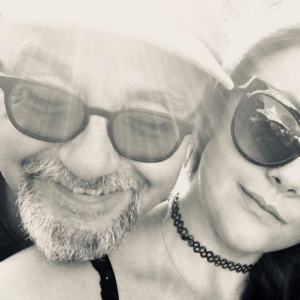VANCOUVER FOLK MUSIC FESTIVAL
featuring Finnish Duo Vildá
CONTENTS
- INTRO: Finland’s Vildá is Wild: Keeping Their Culture Relevant
- INTERVIEW: Finnish Music Quarterly: Vildá’s Hilda Lansman: If Our Memory Fails Us We Exist No More
- PLAYLIST: Debut album Vildaluodda/Wildprint on YouTube and Spotify
- ARTICLE: Yoiking: A Sámi Musical Expression
- AT THE FESTIVAL
- DUET WITH CANADA’S PIQSIQ: Ovddos / Hivumuuniq
- ON INSTAGRAM

FINLAND’S VILDA IS WILD
Rooted in the rugged nature and traditions of Finland’s northern Sámiland, duo keeps their culture relevant
From its start 45 years ago the Vancouver Folk Music Festival has presented its audiences with varied musics and artists from around the globe. It broke ground as Vancouver’s first arts organization to showcase a folk-oriented musical world beyond our boundaries. We are richer for it. This years’ international slate includes musicians from Korea, Mexico, India, Taiwan and Finland, home to award-winning Vildá who hail from the country’s northern region of Sámiland.
The Finnish duo is – literally – “wild”. The word translates to their name –Vildá – in the Sámi language and its an apt description of their sound. With Viivi Maria Saarenkylä on accordion and Hildá Länsman on vocals and frame drum, Vildá is a forceful and subtle, soaring and soft mix of energized rhythm and song. While they are rooted in folk traditions and instruments, their original songs have a contemporary yet timeless edge.
Viivi describes first meeting Hilda at the University of Helsinki in northern Finland and “about two weeks later she asked me to play a small gig with her and that’s when we both realized that accordion and joik works pretty well together,” she says in an interview with Robert von Bernewitz (aka blogger Musicguy247).
Joik (or yoik) is a form of Sámi musical expression that goes well beyond song. The late Sámi author Johan Turi said, “The yoik is not just music. [Its] functions are much broader than that. They are routes to social contact.”
Wikipedia notes, “As an art form, each joik is meant to reflect or evoke a person, animal, or place. The sound of joik is comparable to the traditional chanting of some Native American cultures. Joik shares some features with the shamanistic cultures of Siberia, which mimic the sounds of nature.“
Debut release 2019’s Vildaluodda / Wildprint

The duo’s first album Vildaluodda / Wildprint was well received and last year they were one of the winners of the Music Moves Europe Talent Award 2021.
Writer Tove Djupsjöbacka reviewed their album in Finnish Music Quarterly:
“Vildá is a very refreshing addition to the Finnish world music scene, a combination of top-notch accordion playing by Viivi Maria Saarenkylä and the truly unique sounds that Hildá Länsman produces with her voice, both without words and in her native language, Northern Sámi. We have seen her before in the ensemble Solju, where she makes music with her mother Ulla Pirttijärvi-Länsman, also showing her skills as a singer with blues-pop colours. Here, however, the sound is more down to earth and closer to her yoik heritage.
“Together, the two musicians sound like a much bigger ensemble without losing the intimacy of being only a duo. Personally, I also like how they toy with a popular music feel, as in the cool ‘Utsjoki-disko’. The rhythm is sparkling and energetic, but there is also space for calm and still landscapes with an Arctic feel.
“All tracks are original pieces except for their elegant cover of the Mari Boine classic ‘Goaskinviellja’. Most of them are quite short, sometimes almost too short for my taste. This might be something to work on in the future: how to build musical ideas into something bigger.”
At the Festival
Vildá will appear at the Vancouver Folk Music Festival on Friday, July 15 and Saturday, July 16. Friday they have a one-hour solo performance on the South Stage at 3:50 pm. On Saturday they share the West Stage with Korea’s Sonnoi and Toronto’s Witch Prophet in a workshop called The Power of Three. The hour-long session starts at 2:55 pm.
YOIKING: A SAMI MUSICAL EXPRESSION
by John Weinstock / nordics.info
Yoik is the native Sámi musical expression, sharing features with other indigenous music. The essential parts of yoik are melody and rhythm, though there could be words, gestures and facial expressions. A Sámi could yoik other Sámi, animals or nature itself. A yoik was not a song about someone or something per se; you might think of a yoiker conjuring up, say, his loved one who was far away or a menacing wolf, so that for those hearing the yoik it was literally there in the flesh. A person’s yoik referred to that person, even after death. Hence, a link to memory: as long as someone or an animal was remembered, they were still close.
In the small hunting or herding communities yoik was an identity marker, like a photo carried in a wallet. When a young person began to play a role in the community they received a yoik that followed them throughout life and reaffirmed kinship with other group members. Sami often yoiked alone. Kristoffer Sjulsson, a Sámi from Vapsten Sami village in Sweden, reports:
“A little Sámi girl sat a long while, evening after evening, and sang. The only word in the song [yoik] was vjelha [vielle], brother. That word reminded her of father and mother, sisters and the little brother who was living far away in the south. These memories inspired her and her song that was melodious and beautiful, [and] expressed an intimate longing for those absent.”
The English word ‘yoik’ is both noun and verb, i.e. one yoiks a yoik (Norwegian: joik/joike; Swedish: jojk/jojka; Finnish: joiku/joikata). The Sámi verb juoigat is the verb in all Sami languages; however, the yoiks in various areas of Sámiland differ. In the northwest they are called luohti, moving south vuolle and vueliea and to the east leu’dd. In the luohti the most common intervals were the fourth, fifth and octave. The leu’dd often had a narrative text with much variation. The vuolle (Lule Sámi) had very few words. South Sámi vuelie reminds one of the leu’dd where words were preeminent. All but the luohti have mostly died out.
Yoik is closely tied to Sámi culture past and present, nomadic reindeer hunting and herding in the arctic environment.
Stay tuned and get yoiking!

18 June 2022






